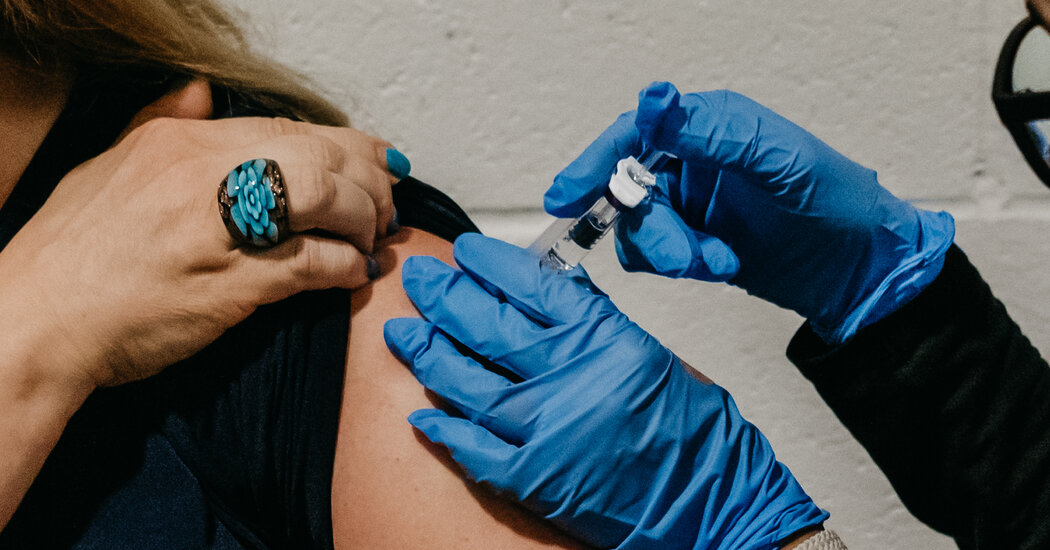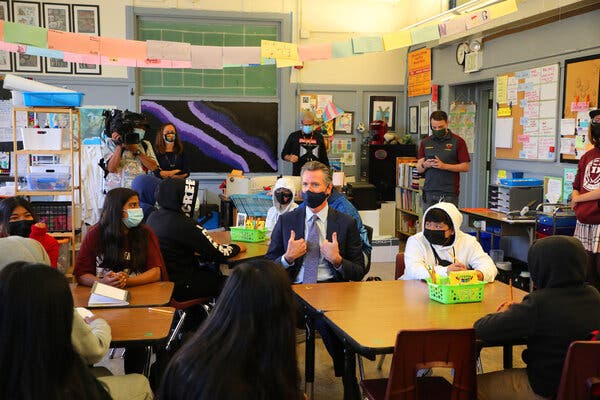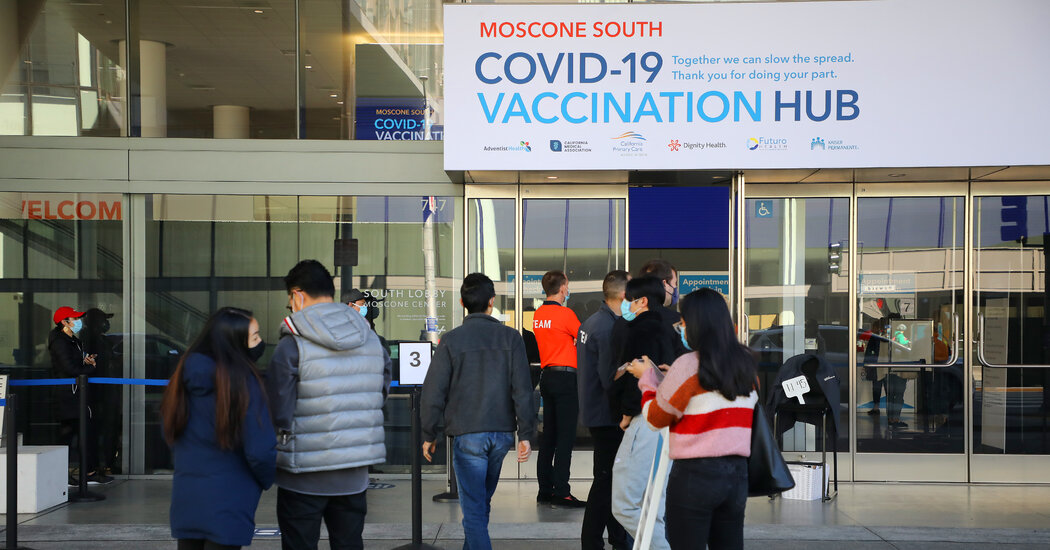When Gov. Gavin Newsom signed into law a bill that would punish California doctors for spreading false information about Covid-19 vaccines and treatments, he pledged that it would apply only in the most “egregious instances” of misleading patients.It may never have the chance.Even before the law, the nation’s first of its kind, takes effect on Jan. 1, it faces two legal challenges seeking to declare it an unconstitutional infringement of free speech. The plaintiffs include doctors who have spoken out against government and expert recommendations during the pandemic, as well as legal organizations from both sides of the political spectrum.“Our system opts toward a presumption that speech is protected,” said Hannah Kieschnick, a lawyer for the Northern California branch of the American Civil Liberties Union, which submitted a friend-of-the-court brief in favor of one of the challenges, filed last month in U.S. District Court for the Central District of California.That lawsuit and another, filed this month in the Eastern District of California, have become an extension of the broader cultural battle over the Covid-19 pandemic, which continues to divide Americans along stark partisan lines.They could also more broadly test what steps — if any — the government can take to combat the scourge of misinformation and disinformation, even in cases where it affects personal and public health.Gov. Gavin Newsom said a California law that would punish doctors for spreading false Covid-19 information was narrowly focused on malicious intent.Jim Wilson/The New York TimesThe law, narrowly written in hopes of avoiding First Amendment entanglements, would designate the spread of false or misleading information to patients as “unprofessional conduct,” subject to punishment by the agency that regulates the profession, the Medical Board of California. That could result in fines, or a suspension or revocation of a doctor’s license to practice in the state.The California Medical Association, which represents nearly 50,000 physicians in the state, sponsored the legislation, but the doctors involved in the two lawsuits argue that the law’s provisions remain both vague and excessively intrusive.They warn that the law’s definition of misinformation as falsehoods that violate “contemporary scientific consensus” would stifle doctors’ abilities to advise patients honestly about the pros and cons of Covid-19 treatment and practices.Republican-controlled states have gone in the opposite direction. Texas has adopted a law to allow citizens or the state’s attorney general to sue social media companies for removing posts because of political points of view. Legal challenges to it — and another in Florida involving candidates for elected office — have swung back and forth and could reach the Supreme Court.The Spread of Misinformation and FalsehoodsCovid Myths: Experts say the spread of coronavirus misinformation — particularly on far-right platforms like Gab — is likely to be a lasting legacy of the pandemic. And there are no easy solutions.Midterms Misinformation: Social media platforms struggled to combat false narratives during the 2022 U.S. midterm elections, but it appeared most efforts to stoke doubt about the results did not spread widely.A ‘War for Talent’: Seeing misinformation as a possibly expensive liability, several companies are angling to hire former Twitter employees with the expertise to keep it in check. A New Misinformation Hub?: Misleading edits, fake news stories and deepfake images of politicians are starting to warp reality on TikTok.The plaintiffs in California have sought injunctions to block the law even before it goes into effect, arguing that it was intended to silence dissenting views.Dr. Tracy Hoeg said the law would “cause this very broad self-censorship and self-silencing from physicians with their patients.”Anne Chadwick Williams for The New York TimesOne of them, Dr. Tracy Hoeg, a physician and epidemiologist who works in Grass Valley, near Sacramento, has written peer-reviewed studies since the pandemic began that questioned some aspects of government policies adopted to halt the spread of Covid-19.Those studies, on the efficacy of masks for schoolchildren and the side effects of vaccines on young men, exposed her to vehement criticism on social media, she said, partly because they fell outside the scientific consensus of the moment.She noted that the medical understanding of the coronavirus continues to evolve, and that doctors should be open to following new evidence about treatment and prevention.“It’s going to cause this very broad self-censorship and self-silencing from physicians with their patients because it’s not clear what we are and aren’t allowed to say,” said Dr. Hoeg, one of five doctors who filed a challenge in the Eastern District. “We have no way of knowing if some new information or some new studies that come out are accepted by the California Medical Board as consensus yet.”The lawsuits highlight the legal hurdles facing states that have sought to curb misinformation or disinformation, especially online. While states controlled by Democrats have sought to compel the social media giants to do more to stop the spread of conspiracy theories around the Covid-19 pandemic, Republican states have moved to punish the companies for removing accounts based on political points of view.Ethan W. Blevins, a lawyer for the Pacific Legal Foundation, a conservative legal organization that has criticized the law but is not involved in either challenge, said the state would have a burden to prove that medical disinformation created actual harm and that it was spread deliberately.“The Supreme Court has already said many times that false information is still protected under the First Amendment,” he said.In a statement issued when he approved the law on Sept. 30, Governor Newsom, a Democrat, acknowledged the challenge of protecting doctors’ freedom of speech but said the law narrowly focused on malicious intent and clear deviations from established standards of care.“I am concerned about the chilling effect other potential laws may have on physicians and surgeons who need to be able to effectively talk to patients about the risks and benefits of treatments for a disease that appeared in just the last few years,” he wrote. “However, I am confident that discussing emerging ideas or treatments including the subsequent risks and benefits does not constitute misinformation or disinformation under this bill’s criteria.”The law’s supporters argue that it was needed to protect patients from doctors who had fueled skepticism about vaccines and mask mandates or encouraged the use of drugs like ivermectin and hydroxychloroquine, which have not proved to be effective against the coronavirus.A protest against mandated Covid-19 vaccines outside City Hall in Los Angeles last year.Etienne Laurent/EPA, via ShutterstockEven so, lawmakers narrowed the legislation’s scope to include only direct conversations with patients. Posts on social media, opinion articles or other public statements doctors might make are not subject to the law.The American Medical Association has blamed disinformation for worsening the pandemic’s toll. In June, it adopted a policy that, among other things, called for empowering state licensing boards to discipline doctors who spread it in their capacity as health professionals.Dr. Jeff Barke, a physician who has treated Covid patients at his office in Newport Beach in Southern California, said the law was an attempt by the state to impose a rigid orthodoxy on the profession that would rule out experimental or untested treatments.Those include treatments with ivermectin and hydroxychloroquine that he said he had found to be effective at treating the coronavirus, despite studies suggesting otherwise. “Who determines what false information is?” he said.Dr. Barke joined another outspoken doctor, Mark McDonald, in filing the challenge in the Central District Court last month, represented by two conservative legal groups, Advocates for Faith and Freedom, and the Liberty Justice Center. He said they were defending patients from a “huge medical bureaucracy,” dominated by pharmaceutical lobbies and the state.“What comes next?” he said. “How I talk to patients about cancer? How I talk to patients about obesity or diabetes or asthma or any other illnesses? When they have a standard of care that they think is appropriate and they don’t want me going against their narrative, then they’ll say Barke’s spreading misinformation.”Judge Fred W. Slaughter, who was appointed by President Biden and confirmed by the Senate in March, held a hearing on Dr. Barke’s case this month. He questioned lawyers on both sides about whether the plaintiffs had standing in the case and whether the new law could regulate misinformation as a matter of professional conduct, as opposed to speech.“The statute is clear, especially to trained medical professionals who know what the standard of care is,” Kristin Liska, deputy attorney general for the state’s Department of Justice, told the judge.The challenge in the Eastern District is scheduled to be heard in December by Senior Judge William B. Shubb, who was appointed by President George H.W. Bush in 1990.Richard J. Baron, who heads the American Board of Internal Medicine, said the fight over medical misinformation and disinformation reflected a deeper erosion of trust in society.Certain types of information were undoubtedly harmful, Dr. Baron argued, and doctors have an obligation to protect patients from them, regardless of their political views about public health policies.“It’s the state that gives you a license, and it’s the state that assures that that license gives you a lot of ability that people who don’t have that license don’t have,” he said. “And with that comes the responsibilities of fidelity to the community of experts that generate things like the standard of care that patients are entitled to.”
Read more →



